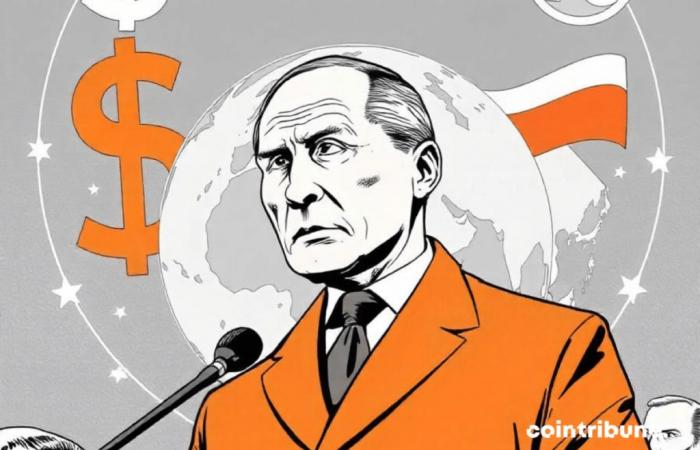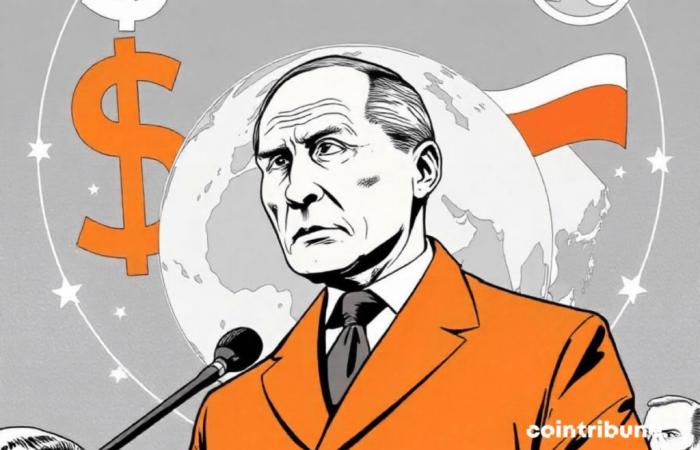16h00 ▪
5
min reading ▪ by
Luc Jose A.
At a time when global economic tensions are redefining financial and political alliances, the question of the role of the US dollar and potential alternatives takes center stage. During the Valdai forum in Sochi, Vladimir Putin clarified Russia’s position on the use of the dollar, in response to American sanctions which restrict its access to this currency. This statement is made in a global context where several nations, particularly within BRICS, are exploring alternatives to the monetary domination of the United States. The analysis of this Russian strategy, which combines pragmatism and exploration of new economic options, allows us to better understand the current issues and the prospects for a new international financial balance.
Russia and the dollar, between pragmatism and distrust
Vladimir Putin insisted that Russia is not seeking to abandon the use of the dollar, despite American restrictions. “We – Russia, in any case – do not reject the dollar and do not intend to do so,” he said. However, the Russian president did not fail to criticize the United States’ strategy. He calls her “very stupid” for cutting off Russia’s access to dollar transactions. According to him, this decision partly undermines American power, which is largely based on the domination of its currency. Putin’s remarks reflect a strategic approach where Russia accepts the dollar as a global economic reality, with a readjustment of its choices to reduce its dependence on American sanctions.
Faced with this situation, Putin spoke of Russia’s adaptation to new global economic trends through the creation of alternative instruments. This choice aims to limit the impact of Western financial restrictions without announcing a head-on break with the dollar. Such a pragmatic position reveals Russia’s desire to strengthen its financial autonomy. Thus, it always remains engaged in international trade, even in a hostile environment.
The exploration of alternatives and the ambitions of BRICS
Beyond the dollar, Putin addressed the possibility of a common currency within the BRICS. However, he tempered expectations on this subject and stressed that such an initiative was premature: “It is too early to talk about it, and we do not have such objectives at the moment.” Putin recalled that the establishment of a common currency would require much deeper economic integration and structural harmonization between the BRICS economies. This project remains an exploratory idea for the moment, because it requires complex coordination and economic convergence which have not yet been achieved.
Putin’s speech goes beyond announcements. He also criticizes the United States for its massive use of monetary issuance, and estimates “that they received 12,000 billion dollars for no apparent reason”. According to him, these resources could be invested in global environmental initiatives, a way for the Russian president to suggest a fairer distribution of the financial gains resulting from the dominant position of the dollar. These prospects show that Russia is considering diplomatic and economic options to influence global monetary governance, even without immediately committing to an alternative currency project.
Putin’s statements at the Valdai forum reaffirm Russia’s ability to adopt an adaptable and resilient financial strategy in the face of international pressures. As the debate over an alternative currency gains prominence, Russia’s caution and the complexity of BRICS plans reflect the obstacles to reshaping the global monetary order.
Maximize your Cointribune experience with our ‘Read to Earn’ program! For every article you read, earn points and access exclusive rewards. Sign up now and start earning benefits.
Luc Jose A.
A graduate of Sciences Po Toulouse and holder of a blockchain consultant certification issued by Alyra, I joined the Cointribune adventure in 2019. Convinced of the potential of blockchain to transform many sectors of the economy, I took the commitment to raise awareness and inform the general public about this constantly evolving ecosystem. My goal is to enable everyone to better understand blockchain and seize the opportunities it offers. I strive every day to provide an objective analysis of current events, to decipher market trends, to relay the latest technological innovations and to put into perspective the economic and societal issues of this ongoing revolution.







